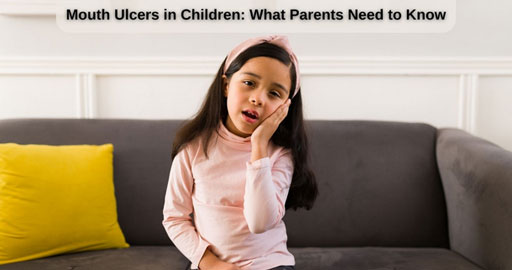
Mouth Ulcers in Children: What Parents Need to Know
Nothing can be more undesirable to a parent than to see his or her child suffering or in pain. The oral health predicament of ulcers is specially very painful. These small deteriorating sores develop in a child’s mouth and make eating, drinking, and sometimes even talking very difficult. Therefore, knowing what causes these ulcers and how to control them can definitely help one relax and free his or her child from such irritations.
What are Oral Ulcers?
Mouth ulcers are also referred to as aphthous ulcers, which essentially mean small sores in the mouth. They are extremely painful and cause much discomfort when having any food or drink in the case of children. They mostly come in round or oval shape, appearing bright red at the border and yellow or white at the center. These small ulcers might also form on the tongue, or inside the cheeks, on the lips, or near the base of the gums.
What Causes Mouth Ulcers in Kids?
A child may develop an oral ulcer due to several etiological agents, although the most common is mild trauma, which includes biting by teeth on the tongue or inner cheek and vigorous brushing of teeth, as well as effective dental procedures. The deficiencies in nutrition, especially in vitamins B-12, zinc, folate, and iron, predispose the child to have an increased incidence of having oral ulcers.
- Food Sensitivities or Allergies: Some foods, especially those acidic in nature or spicy, can be held accountable for irritating the sensitive tissues inside the mouth. It thus results in ulceration in people who are prone to getting an ulcer.
- Viral Infections: Sometimes, mouth ulcers in children result due to viral infections, like herpes simplex virus.
- Stress: Emotional stress or anxiety can depressed the child’s immune system. The depressed immunity favours the development of oral
ulcers.
How to Take Care of Oral Ulcers in Kids
Though oral ulcers cause pain, there are various methods through which the pain is reduced and the healing of ulcers is encouraged:
Oral hygiene includes gentle brushing of teeth with a toothbrush since hard brushing would further irritate. The area can be cleaned by using mild mouthwash that does not contain alcohol.
- Dietary changes: Avoid those foods that seem to irritate your child’s ulcers. Good eating—plenty of fruits, vegetables, and whole grains —should be ensured.
- Topical Treatments: Over-the-counter topical gels or ointments containing the numbing agent benzocaine can also be rubbed on passively for instant relief. Always consult with a pediatrician or dentist before giving any medication to a child.
- Home Remedies: Gargling with warm water and salt or with a baking soda paste would comfort the irritation to a certain extent and decrease swelling. More so, washing out the mouth with a solution prepared by mixing hydrogen peroxide in water will kill certain bacteria causing infections inside the throat.
- Stress Management: The things that interest the child should be found out to relieve the child from stress. Breathing exercises, meditation, and other forms of this kind may also be tried by the child for relief from stress.
- Consult a health professional: In case the ulcers remain more than two weeks, appear larger than usual or recurrent; in the case of your child having raised fever or if the pain is so severe that the child is unable to eat and drink, then you must reach the health professional with much urgency.
How to Prevent Oral Ulcers
Although ulcers in the mouth cannot be prevented, there certainly are a number of things that can be done to lower their incidence, such as good oral hygiene: with the practice of regular brushing, flossing, and visits to the dentist, even at home, prevent the acquisition of oral infections that may lead to ulcers; and a healthy diet: your kid needs a well-balanced diet that is enriched with vitamins and minerals to keep his immune system at best.
- Stress reduction: Home should be free of stress. Your kids should be equipped with coping skills so that they can fight back against stress very well.
- Avoiding irritants: Observe those foods or other substances which cause ulcers and avoid exposing your child to them.
When to Seek Medical Care
Although most of the childhood oral ulcers self-decide and heal within a week or two, there are some conditions under which the ulcers should bring attention to medical health care:
- High Fever: When oral ulcers are associated with a high fever, then consultation with healthcare is advised.
- Difficulty Eating or Drinking: Medical consultation is also advisable or necessary when the oral ulcers are obviously causing reduced eating or drinking.
- Recurrent Ulcers: If your child is having recurrent or one after the other type of ulcers, then the health professional will help you in recognising probable predisposing factors and proper treatment.
Remember that everything concerning your child when he/ she is afflicted with oral ulcers lies in the alertness and care of a parent. Knowing the reasons and taking precautions and taking your child into a doctor’s consultation room at the right time will let you be in command over his oral health and comfort. After all, things need not be that irksome with those painful sores in the mouth, and that smile will once again be present on your child’s face with a little more care and attention.
Leave a Reply
Leave a Reply
Explore More Similar Posts
Explore More Blogs


Leave a Reply